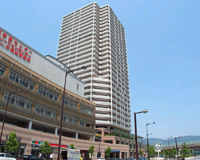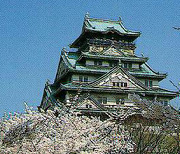|
  
- UID
- 12794
- 帖子
- 8835
- 积分
- 11329
- 学分
- 56097 个
- 金币
- 800 个
- 在线时间
- 826 小时

|
|
Osaka (Japan) |  Famous for its down-to-earth(现实的,务实的)citizens and hearty(丰盛的)cuisine, Osaka combines historical and cultural attractions with all the delights of a Japanese urban phenomenon. At night Osaka is live-wired with flashing neon, beckoning with promises of good times and a lot of beer. Famous for its down-to-earth(现实的,务实的)citizens and hearty(丰盛的)cuisine, Osaka combines historical and cultural attractions with all the delights of a Japanese urban phenomenon. At night Osaka is live-wired with flashing neon, beckoning with promises of good times and a lot of beer.
Often maligned(诽谤,侮蔑)by visitors as 'ugly' and still best viewed under the neon light of night, Osaka is currently undergoing a facelift to woo(争取……的支持,拉拢)daytime visitors. Improvements to its historic port and much-needed attention to its waterways and canals is slowly restoring Osaka's maritime heritage and remaining natural assets.
Leading the makeover is a rediscovery of the city's commercial, cultural and culinary(烹饪的)importance. Along with their peculiar and unique Osaka-ben dialect, Osakans have a down-to-earth philosophy and a rare flare for food, fashion and frivolity.
The city was flattened during US bombing in WWII and the rebuilding process saw Osaka plastered over in concrete, a legacy that remains. Osaka is now on the move again, but it must also deal with a huge homeless problem, resulting from Japan's ongoing economic slump.
Summers in Osaka are hot and sticky, which can make travelling quite uncomfortable. In winter, although snow is rare, it does get cold and you will need to pack plenty of warm clothes. The best time to visit Osaka, if you want to catch some cherry blossom action, is April through to May or, if you would like to see the leaves change colour and fall, October and November.
 Osaka has been a major port and mercantile centre(商业中心)from the beginning of Japan's recorded history. It was also briefly the first capital of Japan (before the establishment of a permanent capital at Nara). During its early days, Osaka was Japan's centre for trade with Korea and China. Osaka has been a major port and mercantile centre(商业中心)from the beginning of Japan's recorded history. It was also briefly the first capital of Japan (before the establishment of a permanent capital at Nara). During its early days, Osaka was Japan's centre for trade with Korea and China.
In the late 16th century, Osaka rose to prominence when Toyotomi Hideyoshi(丰臣秀吉), having unified all of Japan, chose Osaka as the site for his castle. Merchants set up around the castle and the city quickly grew into a busy economic centre. This development was further encouraged by the Tokugawa(德川家族), which adopted a hands-off approach to the city, allowing merchants to prosper unhindered by government interference.
Tokyo has usurped Osaka's position as economic centre of Japan, and most of the companies formerly headquartered in Osaka have moved east. Nonetheless, Osaka remains an economic powerhouse and the prefecture(辖区)has recorded a GDP bigger than the individual GDPs of all but eight countries in the world in the past several years. However, the city has been hard hit by Japan's ongoing recession and many businesses have closed, particularly those that used to cater to businessmen out entertaining clients.
|
|
|